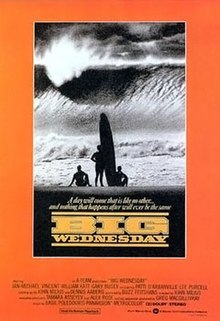John Milius’ Big Wednesday was the first major portrait of a California youth subculture since George Lucas’ seminal (and far superior) American Graffiti, back in 1973.
Grade: B- (**1/2* out of *****)
| Big Wednesday | |
|---|---|

Theatrical release poster
|
|
As such, it received a lot of critical attention when initially released in 1978. Some critics saw “Big Wednesday” as a “sermon” delivered over an empty grave. Others detected too strong an influence from the big masters, such as John Ford and his notion of social community, and Howard Hawks and his recurrent theme of male professionalism.
Nostalgic and elegiac, the film tells the story how the threat of military draft affect one clique of friends, well played by Jan-Michael Vincent, William Katt, and best of all Gary Busey.
(In the same year, Busey also excelled in the biopic, The Buddy Holly Story, for which he was Oscar-nominated.
“Big Wednesday” begins with a pseudo-Hemingway voice-over: “In the old days….,” which places the characters within a particular surfing saga.
Unfolding as a journal of friends as they morph into adulthood, the movie follows their lives over a decade or so, while dwelling on surfing as a lifestyle and ritual.
Structurally, the yarn is divided into four parts, each beginning with voice-over narration and accompanied by the visual imagery of an ocean that changes according to the seasons.
The first part, “The South Swell,” set in the summer of 1962, (about 40 minute long), is followed by “The West Swell,” in the fall of 1965 (about 30 minutes) and “The North Swell,” set in the winter of 1968 (about 13 minutes).
The movie concludes with a segment titled “The Great Swell,” which takes place in the spring 1974, at the end of the Vietnam War era.
Who are the trio’s members? Leroy (Gary Busey) is the court jester; Jack (William Katt) is the laid-back and establishment-prone; and Matt (Jean-Michael Vincent) is the Adonis of the group and keeper of the flame.
The movie suggests that while these guys may be “beach bums,” they also have personal dignity and subscribe to a distinct set of moralistic values.
Big Wednesday sees its anti-heroes as the new Knights of Malibu, boys/men who are engaged in a mythic quest to find the “perfect wave.” The three legendary surfers are described by the narrator as “the kings, our own royalty.” The boys ride the waves, throw beach parties, and get into scrapes.
The movie conveys vividly the alluring mystique of surfing, and how it confers moral exaltation on the three buddies, who singly and collectively lament the passage of their youth. As impressionable youngsters, they acquire sort of an oral history of the ocean and its waves from a senior surfer, “Bear” (Sam Melville).
However, the notion of youth conveys different meanings for the lads. For Leroy, it may be the joy of painting the torso. For Jack, it’s going to Vietnam for three years and then coming home expecting his old girlfriend to be waiting for him, unaware that she’s now married. For Matt, it means minimal talk and expressing his feelings through his body’s physical gestures.
The movie distinguishes between growing up and growing old. “It’s really different here,” says a girl from Chicago who’s initiated into beach life. “Back home, being young was just something you’d do until you grew up. Here…it’s everything!”
As time goes by, however, the trio must cope with the escalating Vietnam War and embark on the tough road to maturity and responsibility.
Reportedly, director-writer Milius based the film’s macho world and contemplative meditation on the waning of dreams upon his own youth.
Though episodic by necessity, Big Wednesday is narratively shapeless, and marred by too many events and incidents thrown into its text.
Initially, the movie was a commercial failure, but over the years it has developed a small cult following, led by the like of Tarantino and company.
Cast
Jan-Michael Vincent as Matt
William Katt as Jack
Gary Busey as Leroy
Patti D’Arbanville as Sally
Lee Purcell as Peggy Gordon
Sam Melville as “Bear”
Darrell Fetty as “Waxer”
Robert Englund as “Fly”
Barbara Hale as Mrs. Barlow
Fran Ryan as Lucy
Reb Brown as “Enforcer”
Joe Spinell as Psychologist
Gray Frederickson as Doctor
Credits:
Directed by John Milius
Written by John Milius, Dennis Aaberg
Produced by Buzz Feitshans
Cinematography Bruce Surtees
Edited by C. Timothy O’Meara, Robert L. Wolfe
Music by Basil Poledouris
Production company: A-Team Productions
Distributed by Warner Bros.
Release date May 26, 1978
Running time: 120 minutes
Budget $11,000,000
Box office $4.5 million










